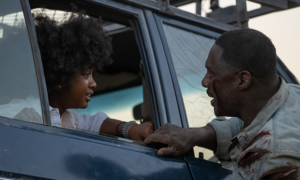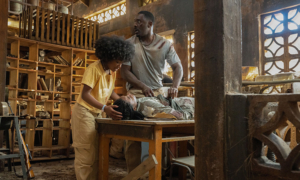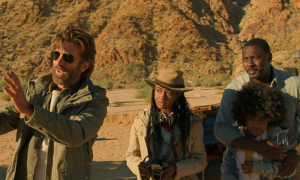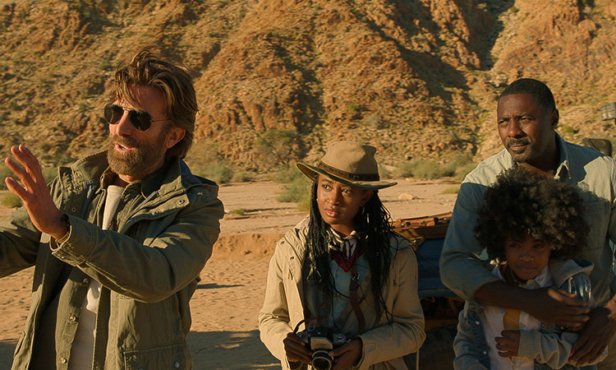There’s something inherently terrifying about the natural world. Whether it be our recent brush with a global pandemic, the existential terror of climate change or simply threats that lurk in a darkened wood or ocean, the notion that man’s mastery of his environment is tenuous at best has proven to be fertile ground for storytellers for centuries.
Whether it be Herman Melville’s Moby Dick, Hitchcock’s The Birds, Spielberg’s Jaws, Soderbergh’s Contagion or even more fanciful fare such as Alien, Jurassic Park and Predator, the idea of humanity brought low by the full force of nature has become a staple of both popular culture and popular cinema.
The latest film to join this potent sub-genre is Beast, the new film from director Baltasar Kormakur (101 Reykjavic, Everest, 2 Guns) and producer Will Packer (Straight Outta Compton, What Men Want) which stars Idris Elba, Sharlto Copley, Leah Jeffries and Iyana Halley. It follows the story of recently widowed Dr Nate Samuels (Elba) and his two daughters who travel to the South African savannah for a healing family vacation after the death of their mother. But this family bonding trip soon turns into a fight for survival when a bloodthirsty lion, a lone survivor of illegal poachers, begins stalking their terrain and taking revenge on the humans who’ve abused him.
“I’m somebody who’s always wanted to be associated with films that are both fun and an escape from reality,” says Beast’s producer, Will Packer. “But with this film we’re also interested in the issues underneath the story we’re telling. Whether that be illegal poaching, the damage done to community environments and man’s disrespect of nature.”

Despite those lofty interests, Beast is also very much a classic Universal creature feature – ‘Cujo with a lion’ was the initial pitch! – as well as being a summer popcorn movie. Is balancing those two competing ideals hard? Packer is forthright on this. “It’s no secret it’s a summer film and that needs a clean, visceral idea to cut through a very oversaturated content environment. But beyond that you’ve got to have something for people to latch onto and characters for them to care about.” Did that mean the hiring of Elba as the lead was a crucial part of that process? Packer smiles. “To be frank, some of the earliest conversations Idris and I had were: ‘Yeah, this is a cool idea for a film, but how do we make it worth making?’”
So did they achieve that aim? “Well, that’s a big thing for (Elba). This is our sixth movie together, so I know he’s always looking for ‘what’s the next layer’? What we all liked was that he isn’t playing some expert lion hunter guy. This is a guy clearly not in his usual environment and who’s extremely vulnerable, in every sense. But the beast of the title isn’t just the lion. The beast is man. It’s the poachers who’ve destroyed this lion’s pride, but also Idris. He becomes a beast who’s fighting for his life and his family.”

With producer, star and script in place the next step was attracting a director who could deliver the promise of the project onscreen. Even by his own estimation, director Baltasar Kormakur wasn’t an obvious choice for this type of movie. “I like genre movies and I’ve done procedurals before, but I haven’t done a lot of work in this area, ” he says. “What I like about genre is that it gives you a tight frame where you have to deliver – you have to deliver tension, you have to deliver scares – but at the same time you can put in more personal elements too.”
One of the film’s great strengths is the sense of immersion in the environment. Partly this is due to the ten weeks of location filming in South Africa, but it’s also down to deliberate directorial choices made by Kormakur: “We favoured long takes to create a claustrophobic and visceral environment as well as seeing it through the character’s point of view. You feel like you’re there and that something is coming at you, because you can’t get any visual information or clues that are outside of the shot.”

Another environment that the film finds itself competing with is the post-Covid theatrical environment. With Beast eschewing the vogue of a mixed platform release in favour of a theatrical debut, Packer was sanguine about the current debate over streaming versus theatrical. “I’m agnostic about how the film is delivered, but projects are made with an eye towards a certain release platform. This film was always theatrical, but it’ll be interesting to see how audiences respond to a piece of original I.P that’s not based on a huge brand or a comic book that’s in cinemas. That will be telling about where we are as an audience.”
Kormakur agrees with that assessment: “As much as I like the streamers I don’t want to lose the theatrical experience. It’s a really tough environment we’re in at the moment and I appreciate that Universal committed to releasing this in cinemas, but the streaming experience is a different experience and this film was designed for theatres.”
With a solid, but not spectacular US opening weekend haul that debate looks set to rumble on, Packer offers a measured and clear-eyed assessment for the future of this type of film: “In today’s environment audiences will find films wherever they are. If it’s a movie they want to see they will find it. And so whether they’re in theatres on opening weekend or they see it a couple of weeks later on some other platform they’ll find it.”
Beast is out in cinemas now

